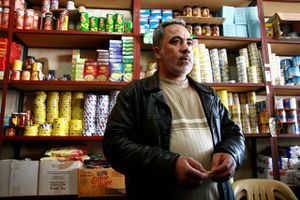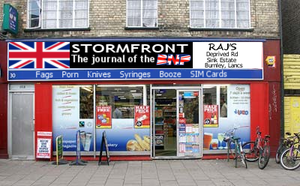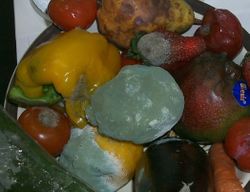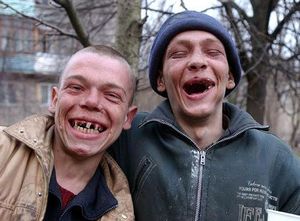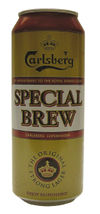Raj's

No matter where you are in the United Kingdom, there will be a Raj's store nearby ready to cater for all your past the sell-by date grocery and girlie mag needs. Raj's stocks everything you could ever wish to buy, and they'll usually be happy to let you off paying for your Special Brew for a few days until your benefits cheque arrives. Although the company operates throughout Europe and North America, the name Raj's is used only in Britain. In the USA, they are usually run by Korean people and will often be named All-Nite Drugs Store, in Germany they will be called Abdul's and will be staffed by Turks and in Greece and Italy by Albanians, where they will be known as Aleksandr's. In Britain, most of the company's shops are known as Raj's though some operate under different names such as Mace, Nip-In or Happy Shopper. No matter what the name, you can be sure that you are about to receive the lacklustre service and contaminated goods that has made the company the resounding success that it is today, just so long as you look for the features common to all Raj's to ensure you have not inadvertently wandered into a shop owned by one of their many competitors; unless you are misfortunate enough to be in France, a nation where all shops are well-stocked with stinky food and are willing to sell alcohol and cigarettes to anybody no questions asked - as such, France has no requirement for the company, and remains the only European country without a single store. Pay close attention to this article to be sure you're shopping in a genuine branch of Raj's.
Finding a Raj's[edit | edit source]
Raj's shops can be found in every British town, in the places where other companies fear to trade. If you find yourself in a sink estate so foul local residents originally from the slums of Calcutta are saving up to return to a better life back home, where every house has boarded-up windows, where packs of feral dogs, children and elderly ladies roam the streets attacking victims at will, get your arse out of there as quickly as possible. While doing so, you may well notice a branch or two of Raj's as you run as fast as you can in an attempt to escape the gang of skinheads and their Staffordshire bull terriers who are trying to catch you and kick your head in for looking like a "homo," "Jew" or "paedo." Raj's are to be found even on those estates where all the cars have dump valves, deafeningly loud stereos and exhaust pipes that make them sound like nitrous-injected Spitfires; those inner-city post-apocalytpic wastelands where the police cars play ear-splitting jungle music instead of the more typical sirens at 3am so as to pass unnoticed by resdients and thus escape coming under a rain of bricks and petrol bombs. Wherever there is need of s shop that sells just about everything you could ever need - from pornographic magazines featuring morbidly-overweight cerebral palsy victims urinating on each other to high-powered hydroponics system grow-lights - there will be a Raj's, the first shop to open in Nagasaki after the atomic bomb, where it sold crack to rats and cockroaches.
The Shop Front[edit | edit source]
Most shops believe that a large percentage of their profits come as a result of customer loyalty; a concept by which customers will, if given the choice, prefer to purchase goods at a store they have shopped at many times previously. Raj's realise that this is only true in the case of the large food chainstores where the customer might particularly prefer the taste of their chosen groceries - for example, Sainsbury customers like to spend a little more allowing them to feel that they are better than their neighbours, Tesco customers want bland, unimaginative stuff they've been eating for years and want it at a reasonable price while Asda customers are fat bastards who don't care what they eat so long as it's cheap, they've got plenty of it and they don't give a damn if it gives them cancer (Waitrose shoppers aren't worth mentioning as there's no opportunity to insult them here, since they're far too middle class for Uncyclopedia and spend all their time on the Guardian Online website). However, Raj's know that they operate in a very different retail sector to any of the above and that a sizable chunk of profits comes from late night shoppers who have run out of cigarette papers or who need just one more bottle of cider to get rid of the shakes so that they can go to bed - these types of shopper are unlikely to feel loyalty towards any particular trading name - in many cases because they are unable to remember them - and will instead purchase their goods at whichever shop they come to first, if only so they don't have to risk being mugged while walking for any further than is necessary through the grotty, run-down urban hell-holes within which Raj's tend to be located. As such, it is possible for them to earn extra income by allowing outside companies to take over the space above the shop's door, which is more commonly reserved for the shop's name, and use it as space for a usually hand-painted advertisement. Prior to the ban on tobacco advertising, this would in most cases take the form of a Superkings logo due to that brand being the most popular cigarette amongst council house dwellers. Nowadays, it is likely to be an advert for whichever newspaper is most popular in the immediate vicinity of any particular store. The shop pictured, which is situated in Burnley, Lancashire, is an excellent example of this phenomenon. This is the cause of severe worries amongst liberal people who avoid having anything to do with racist organisations yet who also wish to support their local Asian independent trader to avoid derision amongst their liberal friends.
Store Layout[edit | edit source]
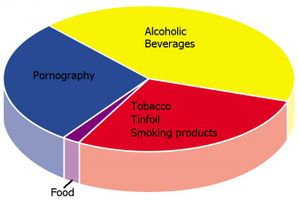
If you are new to the Raj's shopping experience, you may be immediately struck upon entering. Don't worry - that's just Raj using the baseball bat he keeps under the counter to give you a little reminder that he always prosecutes shoplifters, just in case you might have been planning on helping yourself to anything you weren't planning on paying for. It's nothing to fret about - it's just because he doesn't know you. Once you've been into his shop a few more times he'll completely ignore you, which is his way of showing friendliness. The next thing to strike you will be the unusual layout of the shop, which is completely different to stores owned by other companies.
Fresh Produce[edit | edit source]
The first thing you'll notice is that whereas most shops keep their fruit and vegetable department just inside the doors to give the impression of freshness, Raj's fresh produce department - if you can refer to a couple of moulding cardboard boxes with about three hairy satsumas and a rubbery carrot in them as a department - is located somewhere in the gloomiest corner at the back of the shop, quite possibly near the open door with a beware of the dog sign written in felt-tip pen stuck on it, through which you can hear a really rather disturbing low-pitched growl. Nothing to fear - Raj feeds his dog on extra-hot raw steak vindaloo, so it would find your flavour far too bland for its taste and would only bite you a few times, not eat you. There may be a single, sorry-looking apple which has sat on the shelf since 1987, moving only occasionally and apparently under its own steam as the fauna living within it writhe - typical customers of Raj's don't eat a great deal of fruit, unless you count the fruit-flavoured jelly sweets that many of the local single mothers feed daily to their dirty babies for dinner or the brightly-coloured alcopops popular amongst the surrounding area's pre-teenage girls; though older customers may dimly recall a time when there were three apples, before a Japanese student unlucky enough to have found himself housed in bed-bug ridden digs nearby considered 60p per apple an absolutely irresistable bargain compared to the price of fruit in Tokyo and bought them.
Canned Goods[edit | edit source]
Canned goods are likely to fill the first shelves you come to. There will be baked beans with a label that looks like it was made using a dot-matrix printer attached to a BBC B computer, which it was - they were cutting-edge technology when those beans were canned. Like all packaged items with a best-before date in the store, the part of the label that should tell you when the contents are no longer fit for human consumption (nor by any other animal, with the possible exception of seagulls) will have been torn off. If you ask Raj how long they've been there, he'll shrug. However, he will also offer to sell them to you for half their marked price of 25p and so, if you are a student or the adult in a single-parent family surviving on the dole, you will buy them. Raj also stocks items that might be food which you have never seen before, for example tins of pickled spinach and strange slimey red things in jars with labels written in Arabic. If you've just left the pub, the take-away next door has closed for the night, you have an undeniable urge for a curry and are so intoxicated you fancy making a drunken attempt at cooking one you might buy these too, so make sure you don't forget to pick up a pack of four toilet rolls, because you're going to need them like never before come the morning. These toilet rolls will cost you £3.99 for the anally-lacerating Happy Shopper brand, even though the infinitely more luxurious triple-ply extra-soft velvet ones in the supermarket cost £1.49. It's your choice, where else are you going to get them at half past midnight? Raj knows this, so he can charge however much he likes.
The Household Goods Department[edit | edit source]
Before long, you will come across metal shelves filled with boxes and bottles of cleaning products, all of them once again brands of which you have not previously heard, for example Flasho polish and Lowdour washing powder, the latter being intended for hand-washing clothes since the last washing machine in the area was repossessed by bailiffs working for Rumbelow's in 1983. Notice that many of these products have peculiarly 1950s-style packaging. A brief examination of the three-inch thick dust settled upon each box will explain why this is - that's how long they've stood there for. People round here don't clean their houses very often, preferring to resort to anti-social behaviour so that the council rehouses them in a newly-built property somewhere else in town instead. Once that one becomes dirty - which is likely to be within a few months, since they usually share the house with around eight poorly-housetrained children and a similar number of dogs that have only marginally better lavatorial habits - the cycle repeats.
Raj also sells strange, old-fashioned items that you thought had gone out of production years ago. Things such as mothballs, mouse-traps and fire-lighters. You may wonder why he stocks fire-lighters since all the houses in a three mile radius have been built since 1970 and as such are fitted with gas-fired radiators instead of open fireplaces. The reason is that, once they are ignited, fire-lighters fit perfectly through the letterboxes of houses inhabited by Polish immigrants.
You may also find items such as flesh-coloured nylon tights (for some reason, Raj doesn't sell tights in any other colour) which will cost more than silk ones did during WW2 rationing. Despite the high price, they'll ladder from heel to thigh the moment you try to put them on...erm, or so my wife says, anyway. Tights are, inexplicably, kept on the same shelf as stationery where you can also obtain paperclips, boxes containing 5000 elastic bands which have somehow melted due to direct sunlight even though the entire shop is in a state of perpetual twilight because Raj doesn't believe in spending his hard-earned income on things like new fluorescent tubes to replace the seven (out of a total of eight on the shop's ceiling) that haven't worked within living memory, razor blades which may or may not have been collected from the supposedly tamper-proof sharps containers attached to all the litter bins along the street and resharpened by Raj's nephew from Bombay on a grinding wheel in the shop's rubbish-filled and vermin-infested garden, and condoms which, like the food, will have long since passed their use-by dates. The latter may explain why it is that all the local families have at least six children, or it may be down to the fact that childhood mortality rates in the vicinity are several times higher than they were in Victorian days and so families like to have as many offspring as possible in order to guarantee a source of income when the parents hit old age (which generally happens when they get to 35 - a lifetime spent surviving on £1-for-20 beefburgers and cheap cider is not a healthy one).
Alcohol[edit | edit source]
Sales of alcoholic drinks account for around 50% of Raj's total business,[1] which is why one entire wall of the shop is given over to displaying the huge selection he has on offer. Approximately 20% of the total alcohol shelf space will be devoted super-strength lagers with a similar amount given over to cider, Thunderbird, cheap Canadian whiskey and other drinks popular amongst children with the rest filled with assorted wines, none of them from producers of which you will have ever heard before, which are sold at four bottles for £10. On the top shelf there will be a very antiquated, dust-covered bottle of champagne priced at some seemingly randomly chosen amount such as £23.47. This wine is famous amongst champagne connoisseurs, some of whom would be willing to pay as much as £3 for it, but only as an example of how awful bad champagne can be.
Raj does not use pre-printed shelf edge labels as seen in most shops, preferring to use tatty bits of fluorescent cardboard with the prices written in permanent marker which he sellotapes below the stock. Almost of all of these will be mis-spelled: for example, a label might say, "Giness, £1.10,"[2] even though he presumably had several cans of the famous Irish stout in front of him when he wrote it.
Toys[edit | edit source]
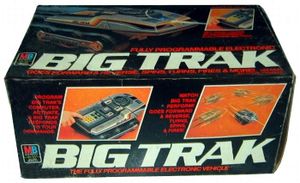
Though technically a chain of grocery stores, Raj will sell anything people might wish to purchase and as such stocks a range of toys. These will generally take the form of cheap, Far-Eastern battery-operated remote control vehicles, robots with flashing eyes and bunnies that supposedly jump in the air and flip over - they don't, though, because they are all broken. All of this will be exorbitantly priced and those that are supplied with batteries will have highly-corrosive acid leaking from them. Very occasionally, these will be bought by despairing drunken adults who feel guilty having just beaten their children in the street outside the shop in an attempt to stop them from crying. The toys will not work, even if new batteries are inserted. If the adult then takes the toy back into the shop, Raj will tell them that they need to put batteries in it, even though the parent explains that they have done so. Raj will then repeat himself, in a thick accent even though he usually speaks in the local manner, as he waves vaguely in the direction of his shelf full of Lucky Seahorse Manu. Corps, Xinjang Province, China batteries which cost three times as much as Duracell do elsewhere before pretending he can't speak English. The adult will then give up and leave the store, explaining to the child that Raj is an arsehole and that they will never go back to his shop again. However, this will not be the case, because tomorrow morning at 6am they'll be there buying an 8-pack of warm 9% abv lager, before heading for the nearest park bench and eventually going home three hours later to see if their toddlers have burnt themselves sufficiently badly while making their own breakfast as to warrant another beating.
Fireworks[edit | edit source]
Oddly, the sale of high explosives to untrained members of the public is not illegal in Britain, where the population detonate gunpowder devices of varying size during early November in an effort to frighten the evil spirits of Winter away, thus prolonging Summer. Every year, sometime in June, a large section of Raj's will be cleared of stock and then filled with fireworks, many of which will be distinctly hazardous varieties. Raj sells these for no other reason than his famous altruism - realising that all children love fireworks but cannot afford safe European ones, he illegally imports several crates of banned Chinese versions which he is able to sell on at pocket money prices. Every year, the local police will employ a child aged about 13 who they will drive in an unmarked police car to various shops around town to see whether or not they are willing to sell fireworks to under-age people since the legal minimum age to purchase such items in the UK is 18. Raj never fails to take advantage of this situation as it guarantees his shop will be mentioned in the local newspaper. Although he will be fined around £1000, this is a small price to pay and easily recovered as once the story gets out children from miles around will flock to the store knowing that they will not be asked to provide proof of their age.
"Under the Counter" Sales[edit | edit source]
Raj's shop is packed from floor to ceiling with everything you could ever need, plenty of stuff you don't need and quite a lot of stuff you had no idea existed and would never conceivably want. However, all of that accounts for only 50% of his total stock and just a tenth of his annual profits since he also makes money off the books with his flourishing trade in illicit and black market goods.
Tobacco[edit | edit source]
In an attempt to decrease numbers of people taking up smoking and to try to encourage existing smokers to give up the habit, the British Government have repeatedly raised tobacco prices in recent years despite evidence from Prohibition-era America and worldwide anti-drugs policies that even a mentally-retarded mollusc could see suggest that increased government control of suchlike products does nothing to reduce usage and instead promotes unlicensed production and distribution, often carried out by decidedly shady characters and criminal gangs. By adding massive amounts of tax onto the cost of a packet of cigarettes, they also guarantee a source of money to enable themselves to have second homes, expensive foreign holidays and luxury cars; though they claim that these funds are in fact used to finance the National Health Service, an organisation that would have enough money to be the best medical service in the world if those same politicians would agree to be paid the national minimum wage and give the rest to the NHS.
Raj, that canniest of all businessmen, has not just his fingers but his entire arms up to his hairy shoulders in this pie. Via his family in India, he maintains a list of contacts with the ability to bring vast quantities of Indian tobacco packaged in extremely convincing fake copies of popular European brands. Once a week, at around 3am, a dirty old Ford Transit van chugs down the street where Raj's shop is located in a cloud of blue diesel smoke. It stops at the kerb outside the shop and Raj opens his door to the two young Asian men who climb out and begin loading unmarked boxes into his shop. Inside are hundreds of 50 gram packets of tobacco, which he will sell to other local shopkeepers for £40 for a pack of ten or £6 per pack to the public. However, compared to this stuff, normal tobacco is packed with chemicals beneficial to human health. There is more tar in it than several miles of dual carriageway, enough cyanide to keep Nazi Germany going for the intended thousand years of the Third Reich and more benzene than can be found in the Yangtze River just downstream of the factory where Raj's batteries are made. The tobacco is cheap enough to be tempting - but be aware, the contents of the packets are not necessarily the brand you think they are. They are in fact a mixture of various different types of tobacco that have been picked out of cigarette butts retrieved from the shit-filled gutters of Bangalore by disabled street urchins.
Tin Foil[edit | edit source]
A large percentage of Raj's regular customers purchase tin foil daily, though they don't appear to roast chickens very often (nor to have much to do with food at all, other than providing it for a selection of both external and internal parasites). In fact, he sells so much of it that he keeps it on the counter for convenience. Anyone who takes a walk down the street where Raj's shop is located early in the morning will notice little bits of blackened foil accompanied by candle stubs and syringes in shop doorways, which solves the mystery.
Wives and Slaves[edit | edit source]
You want an obedient Asian wife who speaks no English? Raj's contacts can get those for you too - in fact, if you're lucky, he may even have a few chained up in the cellar already so you can just go down and choose whichever one looks least diseased. Who knows what her name is, what she likes and dislikes and where she comes from - she can't speak English anyway, and is probably too traumatised to speak in any language.
Need a cleaner? Why pay some East European woman £10 an hour when Raj can supply you with an eight-year old Indian girl who can be trained to carry out all manner of household tasks? His family already numbers over 7,000 people who comprise a reasonably-sized village in the Tamil province, so any female babies born into the clan are surplus to requirements. What's that? You think buying Indian children to use as slaves is immoral? Not so long ago, female Indian babies were left outside to die, so by selling them Raj is actually doing a good deed. Don't worry that they'll try to run away - any spirit they may have once had was utterly destroyed during the nine months they spent in the dark, damp hold of the rusting old container ship that brought them to Britain. Anyway, even cleaning up after a filthy Westerner is better than being whipped all day long as they work their fingers to the bone in some grotty textiles sweatshop for the equivalent of 0.1p a week. Looking at this way, you can use it as an argument similar to that used by carbon-trading multinational companies who purchase the right to release a certain amount of pollution from another company - by saving one child from a hellish existence in a sweatshop, you have tipped the balance in your favour and can continue shopping at Primark and H&M without a guilty conscience.
Porn[edit | edit source]
So, you've been looking at the admittedly rather comprehensive selection of pornography Raj has openly on display on his magazine rack but you can't quite find the sort of thing you're after, eh? Well, if that's the case it must only be a matter of time before the FBI catch up with you and send you to prison forever. In the meantime, what are you doing on Uncyclopedia? There is no perversion so sick Google can't find it for you. Otherwise, just leave a post on the Uncyclopedia forum outlining what sort of thing it is you're into - we have some users with some very specialist interests on here, one of whom will surely be happy to e-mail you what you need. But, if it's glossy hardcopy you need, Raj is your man. Somewhere in the back of every branch, Raj has a hidden room in which he stores the sorts of porn that'd make a Dutch whore blush and it's highly likely he'll have whatever it is you need - just don't get stopped by the police on the way home. If your needs are truly so bizarre even he doesn't have anything in stock, just tell him what you want and he'll be straight on the phone to a man he knows in Delhi who has a digital camera. There's some very poor people over there who'll do just about anything for a rupee, and the lizards aren't much more expensive.
Car Parts[edit | edit source]
Along with sharpening used razor blades, Raj's nephew who works in the litter-strewn garden behind the shop can strip a stolen car quicker than a priest can strip a choirboy. You need a driveshaft for a 2006 BMW 320i? If he hasn't got one, he can get you one by tomorrow. There is, of course, the worry that when you take it home and go to fit it, you'll discover that you've unintentionally bought the faulty one that was on your car in the first place and which appears to have gone missing at some point during the previous night.
The Clientele[edit | edit source]
One of the strangest of the many unexplained phenomena (the brown stains on the floor, the mystery tin without a label on sale at 30p, why anyone in their right mind shops there) associated with Raj's is that the same basic archetypes of customers are to be found in any one of the 750 stores. Whether you are in the John O'Groats shop or the nearest to Land's End you'll see at least one of the following characters.
The Harrassed Single Mum on Benefits[edit | edit source]
Single Mum exists in a state of perpetual annoyance due to the fact that she has eight children, each if whom was fathered by a different - and in all likelihood unknown - man.[1] Ranging from one month to 14 years, none of them have ever been taught any manners or the ability to speak at volumes lower than 110 decibels. All of the children aged up 10 will be screaming and possibly being sick despite Single Mum's efforts to persuade them to stop by punching them in their filth-encrusted faces. Older children, if male, will be scoping out the premises to see if there is anything desirable enough as to make it worth risking the savage physical beating Raj will inflict upon them if he catches them attempting to steal it (there is nothing worth even a fraction of that price, not even the illegally-imported "special interest" porn under the counter) while female examples will be gathered round a copy of a glossy magazine and involved in a discussion, which is really quite remarkably sexually explicit considering their ages, concerning which contemporary male film/pop stars are well buff. The oldest child, invariably a girl and usually pregnant - though it may be hard to tell due to her morbid obesity - will have picked up a tacky piece of the plastic jewelry that Raj keeps by his counter and will be saying, "Mum, look at this. Pahnd. Pahnd, proper nice innit? Pahnd," in an attempt to persuade her mother (who has just spent her last £3 on a plastic bottle containing 3 litres of lukewarm white wine so that she will be able to get some sleep later on during the afternoon while her children watch horror films and torture one another) that the item is desirable and as such should be bought for her beloved first-born. Single Mum will reply, "What do you want that piece of shit for? It'd make you look like even more of a fat slag than you do anyway." Is it any wonder that Raj keeps his daughters confined to the family home and doesn't allow them to associate with white children?
- ↑ It is often claimed that the absence of a male role model during the formative years of many boys' childhoods is the cause of crime and other antisocial behaviour. However, the sort of personality traits held in high esteem and lauded as masculine ideals by this sector of society means that male children are actually better off without a father, who is likely to be a bad influence.
The Brew Crew[edit | edit source]
Upon arriving at Raj's, take note of whether or not there are any malnourished, miserable-looking dogs skulking about outside (don't get too close - they don't bite, but they have been trained to pickpocket). If so, you have a very high chance of being able to observe the skillful negotiations and haggling of a member of the Brew Crew as they[1] tries to persuade Raj to let them have a six-pack of Special Brew or a packet of tobacco "on tick," meaning that they don't need to pay until they either receive a benefits cheque or manage to sell some stolen goods; in flagrant disregard of the prominent sign displayed by the till claiming that the shop does not offer credit.[2] However, under certain circumstances - ie; the customer buys around a hundred cans of lager weekly - Raj will offer credit, though he may be reluctant to do so if the customer already owes a certain amount. The Brew Crew member, if credit is refused, will stand at the till blocking the movement of other customers repeating, "Oh go on Raj," in a peculiar mix of the Glasgow and Manchester accents common to all of their kind until Raj eventually relents, which he will since it is common knowledge that the Crew are banned from all other shops in town and as such have no choice but to return to his store when they they next need alcohol. Also, he knows which shop doorway they sleep in and is well aware of what a pint of petrol and a match can do to an unconscious drunk huddled in a pile of stinking ex-hospital blankets.
Students[edit | edit source]
In addition to single parent families and elderly people on state pensions, Raj's deprived and run-down locale is host to a great number of students who are generally to be found living in colonies of 16 within houses originally designed to accommodate a family of four and which have subsequently been converted into low-cost flats; as they are able to thrive on a diet consisting almost entirely of baked beans, they rely on his shop for all of their grocery needs. Since they are generally keen to demonstrate their left-wing, non-racist credentials, student customers will tell tales of what a great man Raj is and how he came to Britain with nothing and has worked hard[1] to make a living for himself, of his noble honesty and how he is willing to overlook payment when somebody is truly in need. They are lying, and Raj is a bastard.
- ↑ Hard work being a quality held in high regard by all students.
Skinheads[edit | edit source]
Violent members of neo-Nazi gangs can often be seen shopping in Raj's and, oddly, he is highly respected by them. This is because they have not noticed that he isn't British, because he sells a large selection of knives and cheap hammers, no questions asked, and because they know he could easily kick ten shades of crap out of them.
Conclusion[edit | edit source]
So now you know all about Raj's, the retail chain that sells all the things you could ever need at low prices. Wherever you are, you can be certain there's a Raj's not far and he's waiting to serve you today! Why not pop down and see him now? After all, it's 8am already - you need a beer, don't you?!
